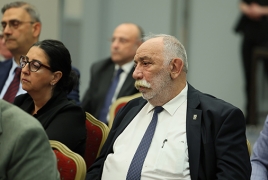
Bagrat Estukyan, editor-in-chief of the Armenian newspaper "Agos," provided details on Armenian Prime Minister Nikol Pashinyan’s meeting with the Istanbul Armenian community, reports Aravot.am .
According to Estukyan, around 50 people attended the meeting, including heads of community institutions, 8–10 journalists, the spiritual leaders of the Armenian Catholic and Protestant communities, but no clergy from the Armenian Apostolic Church.
“The absence of the Armenian Apostolic Church was noticeable. The Prime Minister said, ‘If they didn’t come to me, I’ll go to them.’ But the entire patriarchate building was closed off—apparently to avoid meeting with the Prime Minister. That was a shameful and inappropriate attitude by the Armenian Patriarchate of Turkey toward the Prime Minister, but attendees discredited that stance,” Estukyan said.
He also noted that historical issues were discussed during the conversation.
“Yes, the topic came up, and the Prime Minister clearly stated that the opposite bank of the Araks River is Turkey, not Western Armenia. He said, ‘If we speak of Western Armenia, then others will call our country Western Azerbaijan…’ Let me add—Pashinyan is not the first official representative of Armenia to visit Turkey. Levon Ter-Petrosyan, Robert Kocharyan, and Serzh Sargsyan have all visited as well. Now it seems like Pashinyan is renouncing territorial claims, but he’s not—the three former presidents also officially declared that the Republic of Armenia has no territorial claims against today’s Republic of Turkey. But this has been forgotten, and now people say Pashinyan is abandoning Western Armenia. It’s similar to talk of “returning” Artsakh, which also ignores current realities...
For a century we believed others would liberate our occupied homeland and return it to us. That kind of foolishness doesn’t exist. Thinking about Artsakh’s return is also foolish. Those who fought or fled the battlefield should not be singing songs of return. Any return would mean reconquest—and to conquer, we need strength. Which Artsakh Armenian will go back? They don’t even want to stay in Armenia. Since the 1990s, their first destination has been Russia, not Armenia,” he stated.
Asked about expectations from the Erdogan–Pashinyan talks, Estukyan said:
“There are unresolved issues on the agenda for which agreements exist but haven’t been implemented. We mainly expect the practical realization of those agreements: the opening of a land crossing, establishment of diplomatic relations, opening embassies in Yerevan and Ankara, and a consulate in Istanbul. These are our expectations—normalization of relations and establishment of dialogue.
The Prime Minister explained that in the past, communication between the two countries had to happen through a third party. Now we have direct contact, which is a positive, though still insufficient, development.”
When asked if the issue of Armenian prisoners held in Baku was raised, Estukyan responded, “There was neither a question nor an explanation in that regard.”
He added that the Prime Minister also detailed the “Crossroads of Peace” initiative.
“My only wish is that the Republic of Armenia maintains some firmness in its position and declares it openly. Today, the Prime Minister elaborated on the Crossroads of Peace plan, saying that there are no obstacles for transporting goods eastward. The only route eastward is through the Zangezur Corridor, which is closed on Armenia’s side. That land is Armenian territory, and any passage must go through customs inspection—as is standard at the border of any sovereign country. The same will be applied at Armenia’s border,” said the Agos editor.
During the Erdogan–Pashinyan meeting, the sides discussed the normalization process between Armenia and Turkey, emphasized the importance of continuing constructive dialogue and achieving tangible results. They also addressed regional developments and potential areas for bilateral cooperation.
Prime Minister Pashinyan reaffirmed Armenia’s commitment to ensuring peace and stability in the region and emphasized the continuation of its policy to normalize relations with neighboring countries.

